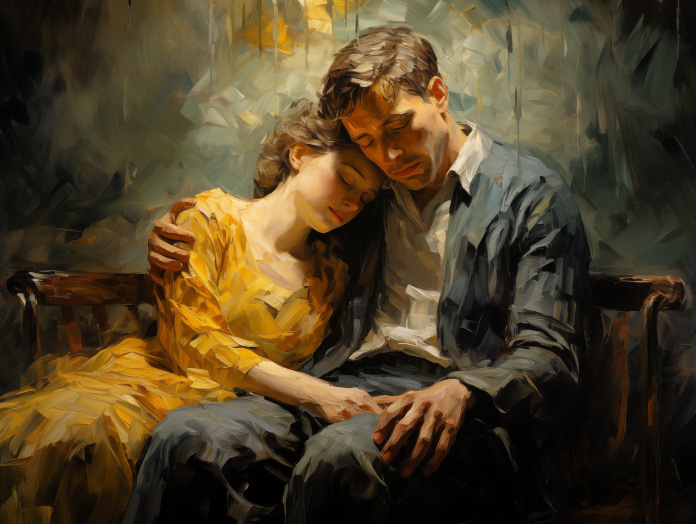“The Good Soldier” by Ford Madox Ford: A Masterpiece of Modernist Literature
Introduction to “The Saddest Story or The Good Soldier: A Tale of Passion” by Ford Madox Ford
“The Good Soldier” by Ford Madox Ford stands as a quintessential piece of modernist literature, capturing the complexities and contradictions of early 20th-century life. The novel, also known as “The Saddest Story or The Good Soldier: A Tale of Passion,” was published in 1915. It explores themes of deception, infidelity, and the instability of human relationships through an innovative narrative structure and a profoundly unreliable narrator. The novel’s enduring allure lies not only in its engaging storyline but also in its profound exploration of human psychology and social mores. This article delves into the elements that make “The Good Soldier” a timeless and intriguing work, examining its plot, narrative techniques, themes, and characters in detail.
Plot Overview of “The Good Soldier” by Ford Madox Ford
The novel is subtitled “A Tale of Passion,” which aptly summarises its central focus on the tumultuous and tragic lives of two couples: the American John and Florence Dowell and the English Edward and Leonora Ashburnham. The narrative is delivered by John Dowell, who recounts the story in a disjointed and non-linear manner, reflecting his confusion and the chaotic nature of the events. Through Dowell’s eyes, we witness the gradual unravelling of the characters’ lives as secrets and lies come to light. The novel’s structure, with its series of revelations and shifting perspectives, mirrors the complexity of the relationships it portrays. As the story progresses, the reader becomes immersed in a world where nothing is as it seems and where each character’s motivations and actions are continually re-evaluated.
Narrative Technique in “The Good Soldier” by Ford Madox Ford
One of the most striking features of “The Good Soldier” is its narrative technique. Ford employs a first-person narrator whose reliability is constantly in question. John Dowell’s fragmented and retrospective storytelling reflects the disintegration of his understanding of the events and characters around him. This narrative style not only engages readers but also mirrors the chaos and uncertainty of human experience, a hallmark of modernist literature. Dowell’s tendency to digress and contradict himself adds to the sense of ambiguity and instability. The reader is often left to piece together the true nature of events from Dowell’s unreliable account, creating a reading experience that is both challenging and deeply rewarding. This approach forces readers to confront the limitations of perspective and the elusive nature of truth.
Themes and Motifs in “The Good Soldier” by Ford Madox Ford
- Deception and Self-Deception: The characters in “The Good Soldier” are enmeshed in a web of lies and half-truths, both to each other and themselves. Edward Ashburnham, the so-called “good soldier,” is a paragon of outward respectability but harbours numerous illicit affairs. Florence Dowell, ostensibly a fragile invalid, manipulates those around her to maintain her extramarital relationship. The pervasive deceit underscores the novel’s exploration of the disjunction between appearance and reality. The characters’ self-deceptions further complicate this theme as they justify their actions and maintain illusions about themselves and others. The novel paints a bleak picture of human nature, suggesting that deceit is an intrinsic part of social interactions and personal identity.
- The Fallibility of Memory: Dowell’s narration, marked by its inconsistencies and omissions, highlights the unreliability of memory. His account shifts as he attempts to piece together the past, revealing the subjective nature of recollection and the difficulty of attaining a definitive truth. This motif aligns with the broader modernist preoccupation with the fragmented and uncertain nature of perception. The novel challenges the idea of an objective reality, suggesting that our present concerns and emotions always mediate our understanding of the past. Ford’s exploration of memory underscores the instability of personal and historical narratives and the ways in which we construct and reconstruct our identities over time.
- Marriage and Morality: Through the disintegration of the Dowells’ and Ashburnhams’ marriages, Ford critiques the institution of marriage and the moral codes of Edwardian society. The novel portrays marriage not as a bastion of stability but as a site of emotional and psychological turmoil. The characters’ actions challenge conventional notions of fidelity and honour, presenting a more nuanced and often bleak view of human relationships. The novel exposes the hypocrisies and constraints of societal norms, suggesting that the ideal of marital fidelity is usually at odds with human desires and needs. Ford’s depiction of marriage reveals the complex interplay between social expectations and personal fulfilment, highlighting the tensions and conflicts that arise within intimate relationships.
Character Analysis of “The Good Soldier” by Ford Madox Ford
- John Dowell: As the narrator, Dowell is both a participant and observer, his detachment and passivity contrasting sharply with the emotional intensity of those around him. His gradual realisation of the truths he has overlooked or ignored forms the novel’s emotional core. Dowell’s character is marked by a profound sense of disillusionment and bewilderment as he grapples with the revelations about his wife and friends. His passivity and tendency to idealise others contribute to his blindness to the deceptions around him. Through Dowell, Ford explores themes of self-awareness and the limitations of human understanding, creating a profoundly sympathetic yet flawed character.
- Edward Ashburnham: The titular “good soldier,” Edward embodies the tragic hero, noble yet flawed. His internal conflicts and doomed pursuits of love and honour make him a complex and sympathetic character despite his moral failings. Edward’s character is a study in contradictions: he is both honourable and deceitful, passionate and restrained. His struggles with his desires and duties reflect the broader tensions within Edwardian society as individuals navigate the demands of social propriety and personal fulfilment. Edward’s ultimate downfall is a poignant commentary on the destructiveness of repressed emotions and the frailty of human ideals.
- Florence Dowell and Leonora Ashburnham: These two women are central to the novel’s exploration of deception and power dynamics. Florence’s manipulative nature and Leonora’s calculated control over Edward illustrate different facets of female agency and suffering within the constraints of their societal roles. Florence, with her feigned fragility and cunning, represents a form of destructive manipulation, while Leonora’s attempts to control Edward reveal her suffering and desperation. Both characters challenge traditional gender roles and expectations, highlighting the ways in which women navigate and subvert the power structures of their time. Their actions and motivations add depth to the novel’s exploration of morality and human relationships.
Conclusion
“The Good Soldier” remains a compelling exploration of human nature and societal norms, distinguished by its innovative narrative style and profound thematic depth. Ford Madox Ford’s ability to weave a tale of passion and tragedy through the lens of an unreliable narrator makes this novel a cornerstone of modernist literature. Its insights into deception, memory, and morality continue to resonate, offering readers a rich and challenging literary experience. As readers navigate the complexities of Dowell’s narrative and the tangled lives of the characters, they are invited to reflect on the nature of truth, the fallibility of memory, and the enduring struggles within human relationships. “The Good Soldier” is not just a story of individual lives but a profound meditation on the human condition, making it a timeless work that continues to captivate and provoke thought.





